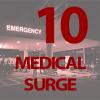


Capability 10: Medical Surge
Definition: Medical surge is the ability to provide adequate medical evaluation and care during events that exceed the limits of the normal medical infrastructure of an affected community. It encompasses the ability of the healthcare system to survive a hazard impact and maintain or rapidly recover operations that were compromised.
Functions and Associated Performance Measures: This capability consists of the ability to perform the functions listed below. At present there are no CDC-defined performance measures for these functions.
Function 1: Assess the nature and scope of the incident
Function 2: Support activation of medical surge
Function 3: Support jurisdictional medical surge operations
Function 4: Support demobilization of medical surge operations
Managing Surge Response and Workforce Activation [1]
This toolkit was designed by Seattle & King County Advanced Practice Center as a guide, not a substitute, for the collaborative planning process that each health jurisdiction must undertake. The planning process, embedded in your local context, is necessary to develop a plan. Your team may add or eliminate sections of the process that will best fit the planning needs of your jurisdiction. The purpose of the toolkit is to help your jurisdiction save time during your planning process by suggesting a planning framework.
A Prescription for Preparedness: An Online Community for Local Health Departments and Pharmacists to Help Ready America for Emergencies [2]
Rx4Prep is an interactive, educational website from the Montgomery County Advanced Practice Center to help local health departments obtain information about collaborating with pharmacies and connect with other users. The focus is on reaching out to pharmacists to ensure that they are included in policy decisions and emergency planning, and to seek their input on the pharmaceutical needs of vulnerable populations.
Medical Surge Capacity Handbook [3]
The Medical Surge Capacity and Capability (MSCC) Management System describes a management methodology based on valid principles of emergency management and the Incident Command System (ICS). Medical and public health disciplines may apply these principles to coordinate effectively with one another, and to integrate with other response organizations. The MSCC Management System emphasizes responsibility rather than authority alone for assigning key response functions and advocates a management-by-objectives approach. Provided by the U.S. Department of Health and Human Services.
Coordinating Call Centers for Responding to Pandemic Influenza and Other Public Health Emergencies [4]
This workbook was designed by CDC's Division of Healthcare Quality Promotion to assist local and tribal jurisdictions and non-governmental organizations in developing an effective emergency response capability
Medical Mass Care During an Influenza Pandemic: Guide & Toolkit for Establishing Care Centers [5]
This toolkit from the County of Santa Clara Advanced Practice Center serves as a resource for local public health departments to develop plans for medical mass care. The toolkit provides scalable, operational direction and tools for the establishment of alternative care sites, i.e. Influenza Care Centers (ICC) to meet the health care needs of patients requiring hospital care who are not able to receive such care at one of the local hospitals. Although the guide focuses on pandemic influenza, the approaches described and the tools provided can be adapted for other medical-health emergencies and hazards requiring medical mass care.
Blueprint for the Use of Volunteers in Hospitals and Rural Medical Centers [6]
This toolkit was developed by the Mesa County Advanced Practice Center to help hospitals and public health agencies integrate volunteer support into hospital inpatient, emergency department, and incident response operations through deployment of "Just-in-time" training (JITT) and exercise curricula.
Emergency Exercise Toolkit for Medical Surge [7]
From CIDRAP: The combined efforts of the Chicago Department of Public Health and the Chicago Health System Coalition for Preparedness and Response produced a toolkit to introduce Homeland Security Exercise and Evaluation Program (HSEEP) policy and guidance in a usable format for hospitals and health facilities. The step-by-step process in the toolkit is intended to help hospitals design, implement, and evaluate emergency exercises for health facilities following the HSEEP format. Downloadable tools include table top exercise guides, master scenarios, exercise evaluation guides, and more.
National Planning Scenarios [8]
The Federal interagency community has developed 15 all-hazards planning scenarios (the National Planning Scenarios or Scenarios) for use in national, Federal, State, and local homeland security preparedness activities. The Scenarios are planning tools and are representative of the range of potential terrorist attacks and natural disasters and the related impacts that face our nation. The objective was to develop a minimum number of credible scenarios in order to establish the range of response requirements to facilitate preparedness planning.
Links
[1] http://www.apctoolkits.com/phworkforceactivation/
[2] http://rx4prep.org/
[3] http://www.phe.gov/preparedness/planning/mscc/handbook/pages/default.aspx
[4] http://www.airs.org/files/public/Disaster_CallCenterPandemicWorkbook.pdf
[5] http://apc.naccho.org/Products/APC20071550/Lists/Product%20Documents/Medical_Mass_Care_During_an_Influenza_Pandemic_Guide_and_Toolkit_for_Establishing_Care_Centers.pdf
[6] http://apc.naccho.org/blueprinttoolkit/index.aspx
[7] http://www.cidrap.umn.edu/practice/hseep-based-emergency-exercise-toolkit-tailors-tabletop-exercises-needs-hospitals-and
[8] https://secure.nccrimecontrol.org/hsb/planning/Planning%20Documents/National%20Planning%20Scenarios%202006.pdf